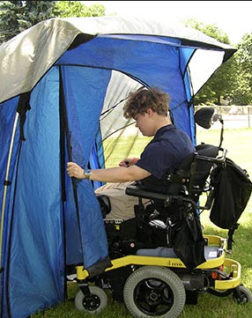Like many activities, camping with a disability has been made easier by accessible facilities and optimized gear. If you want to camp, it just a few modifications, a bit of planning and a willingness to put up with the ruggedness of camping (most campers would agree that this is one of the good parts).
Campgrounds for Camping with a Disability
Choosing Your Camp Site
Finding a camp site that works for you will make or break your camping trip. There are many wheelchair accessible campgrounds, but what that means in reality can vary. To ensure that a campground’s idea of “accessible” aligns with yours, it’s best to call and ask very specific questions, such as:
- How the campground area level?
- Do the grounds have concrete pathways?
- Are there hook ups for electricity?
- Are the showers/toilets accessible?
In addition to getting details about the camp site options, you should also ask about discounts for disabled visitors.
Directory of Wheelchair Accessible Campgrounds and RV Parks
Pitchup provides a directory that facilitates camping with a disability. It lets you can book and review RV parks and campgrounds in the USA, Europe and South America. (There are more than 1,400 bookable parks in the United States). It lest you can filter the list according to what your needs, such as sites that are open all year, are family-friendly, have a bath available, or with pick-up from public transport. You can also filter your selection by over 80 features, such as sites with dogs allowed, sites with indoor pools, accommodation type, user review, location and more. As noted above, it’s best to contact a facility before booking to confirm that they are able to accommodate your needs.
A Few Disabled Camping Tips
- Use rugged, mountain-bike style wheelchair tires when camping in more rugged terrain rather than at sites that are ADA compliant
- Have a plan for storing a wheelchair or other mobility equipment overnight
- Assess tent accessibility
- Consider a sleeping hammock
- Don’t skimp on the sleeping pad – even with a good sleeping bag, you’ll want a pad
- Try a cot, if you have difficulty getting into and out of a sleeping bag
- Bring a headlamp and extra batteries
- Check out Spot Satellite Messenger, if camping solo or in an area without mobile phone reception
- Fully charge powered-wheelchair and have portable battery charger as back up
You might also be interested in the Handicapped Hiking post, which has more information about trails and accessories.


Leave a Reply